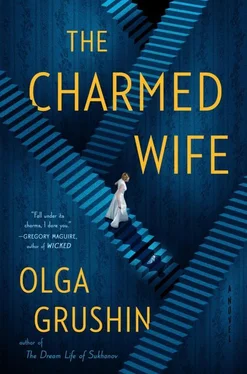She was so badly shaken that she saw it as a sign, and that same night she scratched on the door of Falstaff’s mansion and allowed him a great many liberties on the plushest of his sofas. Immediately upon taking the liberties, however, Falstaff kissed the tip of her paw and said theirs was a most pleasant acquaintance and he sincerely hoped that she had not misunderstood his intentions, which were honorable, of course, but had to take into account the regrettable circumstance that he was the Marquise de Fatouffle’s beloved pet, and she, much as his soul protested against it, was only a common gray mouse—even if her whiskers were wrapped in golden foil. “You understand, my sweet,” he said, and set to brushing his immaculate fur.
She said she did, in a small, small squeak, and, still in the middle of the night, slunk away, and crawled back to Nibbles. She was relieved to hear her friend’s hearty snores continue uninterrupted as she snuggled up to his warm side and, there and then, through her tears, decided that she would accept his suit in the morning. And when she did so, Nibbles was overjoyed, even though he had only pretended to snore the night before. For he had always known where her heart truly belonged, in spite of her fancy whiskers, which, after her six seconds of misguided passion on the dollhouse sofa, she stopped wrapping in golden foil in any case. And if their first litter of mouselings were born with lighter coats than strictly necessary, Nibbles loved her enough to say nothing about it. There would be many more litters in their happy future, for they were blessed that way, unlike their poor princess, who was still carrying one single baby after all these long, long months.)
In August, the prince placed his hand on the rise of her belly, and in September, he rubbed her feet. Her love for him was all complacence, and comfort, and embroidered handkerchiefs. In October, pleasantly aflutter, she was in the midst of preparing for another of his monthly appearances and had just greeted her hairdresser when the baby made itself felt. The prince’s visit was speedily canceled, and thirty-seven hours later, Angelina arrived.
And then her world grew exhausting and warm, and everything smelled of baby formula and laundry detergent, and she was ecstatic, and she was apprehensive, and she was overwhelmed, and she was never alone, which felt oppressive at times, but she was also never, ever lonely. She held the baby close to her heart through vague afternoons and restless nights, for hours and days and weeks. The baby cooed, babbled, and gurgled—mostly—but every so often the baby cried, and then she would tickle its toes, blow soap bubbles, and have Brie and Nibbles dance funny little jigs on the rug. And her diversion tactics worked—mostly—but on occasion they failed, and then she felt as if her world might just split at the seams with the robust wails.
One morning found her lying in bed, limp with fatigue, surrounded by stuffed rabbits and beady-eyed teddy bears in varied shades of pink, with her head throbbing and the baby in her arms still going strong with stalwart howls.
“She will not cease,” she marveled aloud in a kind of dismayed wonder. “Nothing I do will make her cease.”
“Have you tried telling her stories, milady?” asked the teapot of white porcelain with a blue bird on its lid, which, just then, happened to be filling the cup on her bedside table.
“Stories? She’s too little for stories.”
“Not true, milady,” the teapot said, primly and a bit disapprovingly. “Stories are good at any age.”
“But I don’t know how,” she confessed.
“Oh, it’s easy. You go like this—and make your voice melodious-like: ‘Once upon a time, there lived a blue bird.’”
“And then?” she asked, in astonishment, for at the teapot’s singsong words, the baby had stopped crying and was cocking her head, listening.
“Why, then it simply tells itself,” the teapot replied, gathering the creamer and the sugar bowl around her like a mother hen her chickens. “Excuse me, milady, we must rush before I cool off, the marquise likes her tea steaming.”
And so she tried, and it was indeed a miracle, for, as long as the stories kept coming, the baby kept quiet, gazing up at her, spellbound, with milky eyes, eventually drifting into dreams. She had never told stories to anyone before, and the nightly ritual of saying “Once upon a time” felt deeply soothing, like settling into a favorite armchair with a bit of knitting. She told her baby about a poor miller’s daughter who lost her hands but was so virtuous she got to marry a king, and he made her new hands of polished silver, which the queen liked even better. She told her about a beggar girl who hid her beauty under a donkey skin, but her beauty shone through the disguise, so she got to marry a prince. She told her about a poor miller’s son who had a clever cat and got to marry a princess. Best of all, she told her sweet baby about a poor orphan girl who was so good and so pretty that she got to marry a prince—a story that, at first glance, seemed much like the other stories (all of which seemed much like the same story over and over again)—save that it was the one story that really mattered, the only story that was entirely true, the story of Mommy and Daddy, of their fairy-tale love and happily ever after in the beautiful snow globe of a charmed world.
And thus seasons came and went, in stories and feedings and naps, and her waist shrank little by little and color returned to her cheeks. On Angie’s first birthday, as tradition dictated, the royal baby passed into the care of the ever-capable Nanny Nanny, and all at once she had time on her hands. She invented amusing ways to spend her days. She trilled with songbirds, stopped to chat with gardeners and cooks, twirled through the palace dispensing smiles and minor kindnesses. She met the spirit of a long-dead minstrel who haunted the Great Hall and listened to him recite his militant epics, knitted a pair of mouse-eared slippers for the sweet old King Roland, sent homemade preserves to Archibald the Clockmaker and Arbadac the Magician, better known as Arbadac the Bumbler, the elderly brothers who lived at the top of the palace tower and labored over the great clock, which had, for some reason, stopped chiming on the hour and taken to marking random stretches of time instead. In the evenings, she played dominoes with Brie and Nibbles, using gnawed chunks of cheese in place of tiles. (Unbeknownst to her, these Brie and Nibbles were not the original Brie and Nibbles, for, sadly, mice—even those in fairy tales—do not live all that long. Brie and Nibbles the Second were siblings, two of the numerous children of the original Brie and Nibbles, who, when close to dying of satisfied old age, designated the best-mannered and the fattest of their offspring, respectively, to play their parts, so as not to upset the princess with their passing. The second-generation Brie and Nibbles, in truth, did not resemble their parents all that closely, neither in appearance nor in character. Brie the Second, scrawnier and much less garrulous than her mother, did not give any thought to the state of her whiskers, found dollhouses confining, and liked to spend her evenings by the fire in the kitchen, listening to Grandfather Rat sing of the brave deeds of bygone mouse kings. Nibbles the Second, larger and slower than his father, had one all-consuming passion—sleep. They did their best to follow the many detailed instructions of their beloved progenitors—“Brie: collapse in giggles every time you hear Nibbles burp. Nibbles: partake of cheddar daily”—but failed time and time again, and were perennially worried that the princess would discover their ruse. But the princess never appeared to notice.)
Читать дальше












